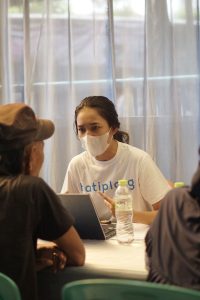BERITA
Mental Health: A Key Factor in the Well-Being of the Waste Workers
Mahija’s strategic approach to empowering and improving the well-being of waste workers is anchored in one of our key pillars: occupational health and safety. In their daily activities, waste workers often operate in poor working conditions, face risks of exposure to various health problems, and have limited access to healthcare services and basic protection.

The health issues faced by waste workers are caused by irregular working hours, poor hygiene, and limited use of personal protective equipment. To address this, Mahija initiated a regular program called Semangat Sehat Mahija (SSM), which provides free health check-ups to waste workers.
Since its launch in 2022, the program has been enthusiastically attended by waste workers at Collection Centers, Collection Partners, and individual participants. In 2024 alone, a total of 5,016 waste workers underwent physical health examinations.
From the results, Mahija found that the most common health issues among waste workers were hypertension, chronic headaches, and muscle injuries or pain. Examinations are conducted by medical professionals from various healthcare institutions, and the participants will receive medication and supportive supplements to help alleviate their symptoms.
However, health checks for waste workers are not limited to physical health, they also include mental health. Through Mahija’s regular interactions with waste workers in various programs, it has been revealed that in addition to meeting economic needs and coping with daily income uncertainty, family and household issues often weigh heavily on their minds, affecting their mental well-being.

This aligns with various studies and data published over the past decade. Research findings show a strong correlation between economic stress and mental health issues, with financial uncertainty and job instability identified as major contributing factors. For example, according to a World Bank report (2023), more than 50% of workers in low- and middle-income countries are in precarious employment conditions, which are strongly associated with higher levels of economic stress and mental health problems.
To support the waste workers, Mahija collaborated with a mental health service provider to conduct mental health screenings and counseling sessions. From February to August 2024, Mahija carried out mental health screenings for 3,820 waste workers across 11 SSM locations, including Kelapa Gading, Jatinegara, Pesanggrahan, Tigaraksa, Cengkareng, Bantar Gebang, Sunter, Legok, Bandengan, and Parigi.
Of the total participants, 8% were referred to psychologists to attend counseling sessions. At that time, 368 waste workers participated in scheduled counseling sessions, which were conducted in an open and interactive manner. It is hoped that these physical and mental health screenings will serve as meaningful support for improving their productivity and motivation at work.
In conjunction with the World Mental Health Day observed every October 10, Mahija reaffirms the commitment to continuously support the health and well-being of waste workers, as part of our ongoing efforts to improve the welfare and working conditions of waste workers within the recycling supply chain.
Subscribe to our newsletter

Contact
- info @mahijaparahitanusantara.com
- +62 811-1233-258
- South Quarter Building
- Tower C LT P Unit A-l
- JL RA Kartini Kav 8, Cilandak Barat
- Jakarta 12430
Quick Links
© MAHIJA PARAHITA NUSANTARA
